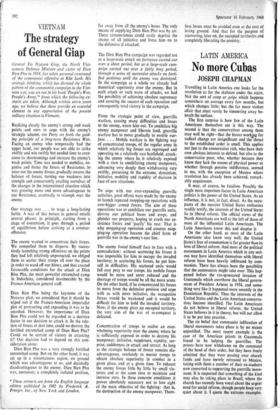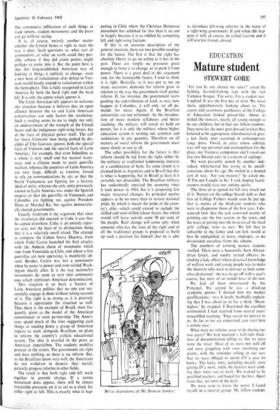No more Cubas
LATIN AMERICA JOSEPH CHAPMAN
Travelling in Latin America one looks for the revolution as for the skeleton under the stairs. Not the sort of coup or golpe which happens somewhere on average every few months, but which changes little; but the far more violent affair that must surely be simmering away be- neath the surface.
The first surprise is how few of the Latin Americans themselves see it this way. The second is that the conservatives among them may well be right—that the forces working for radical change are insignificant and the threat to the established order is small. This applies not just to the conservative rich, who have their own obvious interests to defend, but also to the conservative poor, who, whether because they know they lack the means of physical power or whether through genuine indifference, seemed to me, with the exception of Mexico where revolution has already been achieved, remark- ably acquiescent.
It may, of course, be fatalism. Possibly the single most important factor in Latin American politics is the power of the United States. As an influence, it is not, in fact, direct. As the occu- pants of the massive United States embassies readily testify, the interests of the United States lie in liberal reform. The official views of the North Americans are well to the left of those of most of the influential Latin Americans. The Latin Americans know this and despise it.
On the other hand, as most of the Latin Americans also know very well, the United States's fear of communism is far greater than its love of liberal reform. And most of the political movements in Latin America which in any seri- ous way have identified themselves with liberal reform have been heavily infiltrated by com- munists. There has always been the possibility that the communists might take over. This hap- pened before the CIA-sponsored invasion of Guatemala which overthrew the liberal govern- ment of President Arbenz in 1954, and some- thing very like it happened more recently in the Dominican Republic. Thus the interests of the United States and the Latin American conserva- tives become identified. The Latin Americans do not believe in liberal reform; the United States believes in it in theory, but will not allow it to be put into practice.
The us belief that communist infiltration of liberal movements takes place is by no means unjustified. The most recent example is the case of the American priests in Guatemala found to be helping the guerrillas. The priests have now withdrawn on the command of the head of their order, but they have freely admitted that they were passing over church funds and have merely retreated to Mexico, taking with them a number of their ex-students now converted to supporting the guerrilla move- ment. It is suspected that something of the kind may also be taking place in Brazil, where the church has recently been vocal about the urgent need for social reform, though people keep very quiet about it. I quote the extreme examples. The communist infiltration of such things as trade unions, student movements and the press can go without saying.
It is, of course, entirely another matter whether the United States is right to react the way it does. Such questions as, what sort of communists, or what on earth could they pos- sibly achieve if they did attain power, ought perhaps to come into it. But the point here is that this long-established American way of looking at things is unlikely to change—even a new bout of isolationism after defeat in Viet- nam would hardly extend to isolationism within the hemisphere. This is fully recognised in Latin America by both the hard right and the hard left. It is only the centre which ignores it.
The Latin American left appears to welcome this situation because it believes that an open alliance between the us and Latin American conservatives can only hasten the revolution. Such a reading seems to me to imply not only an underestimate of the strength of the United States and the indigenous right-wing forces, but of the facts of physical power itself. The call for 'more Vietnams' now being pushed by dis- ciples of Che Guevara ignores both the special facts of Vietnam and the special facts of Latin America : for example, that even Indochina as a whole is very small and has natural water- ways and a climate made to assist guerrilla warfare, whereas the countries of Latin America are very large, difficult to traverse, forced to rely on communications by air; or that the North Vietnamese are fighting for a historic ideal of unity, whereas the only unity previously known to Latin America was under the Spanish empire; or that the guerrillas in Venquela and Colombia are fighting not against President Diem or Marshal Ky, but against democratic- ally elected governments.
Equally irrelevant is the argument that since the revolution did succeed in Cuba it can thus be copied elsewhere. Cuba is an entirely separ- ate case, not the least of its distinctions being that it is a relatively small island. The attempt to compare the Cuban Sierra Maestra, from which Fidel Castro launched his first attacks, with the Andean chain of mountains which runs from Venezuela to Chile, and where a few guerrillas are now operating, is manifestly ab- surd. Besides, Castro was not a communist when he came to power and even visited Wash- ington shortly after. It is the way nationalist movements do seem to turn into communist ones which reinforces American determination.
This situation is so basic a feature of Latin American politics that no one can suc- cessfully engage in them without taking account of it. The right is as strong as it is precisely because it appreciates the situation so well. Thus there is the example of Brazil, most fre- quently given as the model of the American commitment or even partnership. The Ameri- cans spend much of the time suggesting such things as sending down a group of American experts to work alongside Brazilians on plans to reform the country's archaic educational system. The idea is assailed in the press as American imperialism. The students mobilise protests in the streets. The government sits tight and does nothing, so there is no reform. But, as the Brazilians know very well, the Americans do not withdraw in despair, they merely patiently propose reforms in other fields.
The result is that both right and left work together •to prevent change. If a centre movement does appear, there will be almost irresistible pressures on it to act as a cloak for either right or. left. This is exactly what is hap-
pening in Chile where the Christian Democrat movement has achieved far less than it set out to largely because it is so riddled by competing left and right-wing factions.
If this is an accurate description of the general situation, there are two possible readings for the future. The first is that the right has .absolute liberty to go on acting as it has in the past. There are simply no pressures great enough to force it to change, or to push it from power. There is a great deal in this argument and, for the foreseeable future, I tend to think it is right. Basically, as it was put to me on many occasions, demands for reform grow in relation to the way the government itself pushes reform. If, for instance, the government starts pushing the redistribution of land, as may now happen in Colombia, it will only set off de- mands for more. Again, if the Brazilian universities are not reformed—by the introduc- tion of more modern syllabuses and better teaching—the military will retain its hold on power, for it is only the military whose higher education system is turning out scientists and technicians in any quantity. Therefore on all matters of social reform the government must move slowly or not at all.
The other possibility for the future is that reform should be led from the right, either by the military or traditional landowning interests or a combination of both. To some extent it is claimed both in Argentina and in Brazil that this is what is happening, but in Brazil at least it is certainly not detectable. The Brazilian military has undoubtedly repaired the economy since it took power in 1964, but it is proposing few major structural changes. Its principal motive appears to be no more than to restore national pride, by which is meant the pride of the coun- try's elite—which could extend to include the skilled and semi-skilled labour forces, but which would still leave outside some 50 per cent of the people. Real change will come only when someone who has the trust of the right and of all the traditional groups is prepared to build up such a position for himself that he is able
'We're dependants of Mr Duncan Sandys.'
to introduce left-wing reforms in the name of a right-wing government. If and when this hap- pens it will, of course, be called fascism and- it will win few friends abroad.



































 Previous page
Previous page